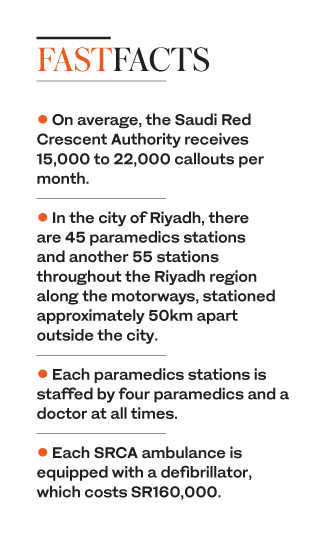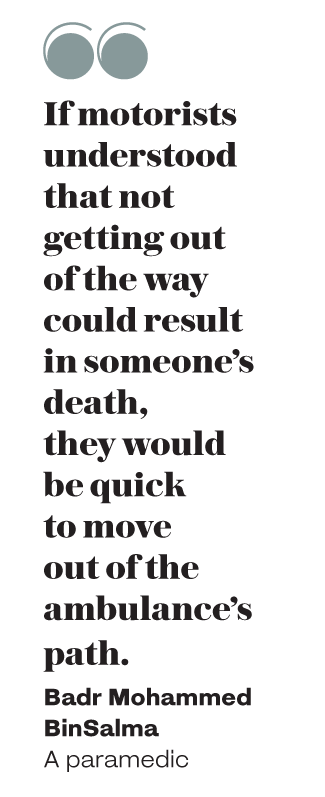RIYADH: Khan was 43 years old. His sponsor had asked him to go to get dinner and come back. But he never did. Instead, when he stepped away from the sport utility vehicle (SUV) he was driving in Diriyah, he suffered a massive heart attack.
A few kilometers away, an emergency call was received at the 997-emergency communications center for “an unconscious man in a car.”
Within a couple of minutes, Badr Mohammed BinSalma and Abdulkarim Hajjed Al-Salmi, of paramedic station unit 90 in Al-Malqa, received the call.
Jumping into their new ambulance, they switched on the lights and sirens and raced along at speed of up to 160km per hour, only slowing down when going through red lights.
Arriving at the scene, they found Khan, a heavy-set Pakistani man, motionless on his back. He was surrounded by two police officers and about 40 spectators. His color was somewhat pale and blue and, when checked, he had no pulse.
“He’s dead,” a police officer told the paramedics in a matter-of-fact manner. “He’s been here for an hour.”
Undaunted, they connected their state-of-the-art defibrillator to him. As it analyzed the state of his heart, they stepped back, expecting the computer-controlled device to give the “stand clear” warning before delivering an electric shock to his heart. Instead, the machine said, “Shock, not advised. Initiate CPR.”
But it was too late for CPR (cardio-pulmonary resuscitation). “There was nothing we could do for him,” BinSalma said after he had covered the man with a sheet.
“What should have happened was that the moment he fell, someone should have begun CPR until we arrived,” Al-Salmi said.
Sadly, that is not what happened at all, and Khan’s life ended at the age of 43 in front of his favorite restaurant, with dozens looking on.
That lack of knowledge, or arguably, education, on the part of the general public in not knowing what to do in an emergency, and not knowing how to differentiate between what an emergency is and what is not, was glaringly obvious during the week Arab News spent with the Saudi Red Crescent Authority (SRCA).
On average, the SRCA receives 15,000 to 22,000 callouts per month. “People do not know how to differentiate between what is an emergency and what is not,” BinSalma said. “They also don’t understand the true purpose of the ambulance.”
While with the SRCA, Arab News attended 15 callouts, of which only four truly required an ambulance. Some of the calls bordered on the ridiculous. One callout was for a man in his 30s who was reportedly unconscious in a car.
As Al-Salmi and BinSalma raced across their sector with sirens blaring, running red lights, foremost on their mind during this urgent response was the memory of Khan who had died a couple of hours earlier. On arrival, they found that the report they received was not entirely accurate as they realized that their 30-year-old patient was completely conscious. He only had flu and cough.
BinSalma asked the man if he had lost consciousness or had vomited, had diarrhea or a fever. The answer was “no” to all the questions.
The man had gone to the hospital an hour earlier and was given a prescription. He took the medication but did not feel better and decided to call an ambulance to see if they could do something for him. We are lucky he did not ask us for a ride to the hospital,” Al-Salmi said. “The SRCA does not deny anyone transport to the hospital, so people call an ambulance when they have an appointment at the hospital and want a free ride to get there. They also call an ambulance when they want to go to the emergency room, but do not want to wait their turn.
We are lucky he did not ask us for a ride to the hospital,” Al-Salmi said. “The SRCA does not deny anyone transport to the hospital, so people call an ambulance when they have an appointment at the hospital and want a free ride to get there. They also call an ambulance when they want to go to the emergency room, but do not want to wait their turn.
“Some even call for an ambulance because they feel lonely and have no one to talk to. That happened a few times.”
BinSalma and Al-Salmi once received a callout for a woman-in-labor call, only to arrive to find that the woman had called 997 because her cat was having kittens and she did not know what to do.
“We told her to just pet the cat and let nature take its course,” BinSalma explained. “Some encounters with the public are laughable. You know, sometimes teenagers pull up alongside the ambulance, get our attention, and then ask us for an ice cream cone. I guess in their mind, the ambulance looks like an ice cream truck. That has happened a few times.”
Due to fact that paramedic services are free of charge in Saudi Arabia, coupled with the fact that paramedics are not allowed to deny a request to be transported to a hospital, there will likely be no downturn in the number of calls that are a complete waste of time, effort and resources. They do not mind being called out for a man with sniffles, but it does keep them and the ambulance they are assigned from attending to a true emergency that could befall anyone, while they are attending to a waste of time.
Both BinSalma and Al-Salmi are “paramedic specialists” who had to study four years to achieve that qualification. They both have seven years of experience in the medical field and are at one of the highest certification levels that internationally accredited paramedics can achieve. They are just two of hundreds of emergency first responders in the Kingdom who can handle any emergency medical situation, and are employed by the SRCA.
Every emergency response ambulance in the Kingdom is staffed by two specialist paramedics, and critical care ambulances are staffed by one specialist and a doctor.
“In the city of Riyadh, there are 45 paramedics stations and another 55 stations throughout the Riyadh region along the motorways, stationed approximately 50km apart outside the city, said Abdullah Al-Muraibid, head of media at the SRCA in Riyadh. “Each is staffed by four paramedics specialists and a doctor at all times.”
Al-Muraibid is a specialist paramedic and field supervisor himself who has been with the SRCA for 15 years.
“As part of the SRCA’s continuous upgrade and development plan, more centers are being built to serve the public, and ambulances are being constantly upgraded and being fitted with the latest in emergency medical technology. As soon as new technology is available, we get it.”
Al-Salmi and BinSalma’s ambulance was one of the SRCA’s 200 new Ford ambulances, which cost upward of half-a-million riyals each and are packed with the latest in emergency medical equipment. Al-Muaridib pointed to one defibrillator that monitors a patient’s cardiac condition, transmitting the electrocardiogram rhythm to the doctors waiting at the hospital for the patient to arrive, who then advise the paramedics in the ambulance on what should be done for the patient, based on the cardiac rhythm it is registering.
That device costs SR160,000 ($43,000), according to Dr. Ibrahim Hassan Edeeb, who is assigned to Al-Malqa Paramedic Center number 90.
“This type of defibrillator is on every SRCA emergency ambulance in service in the Kingdom, and there are hundreds of them,” he said.
On Feb. 28, a Thursday night, which happened to also be payday around the Kingdom, Arab News rode along with Ahmad Al-Asmari, one of four field operations supervisors in Riyadh.
Should there be a multiple-casualty incident, fire, or major injury accident in Riyadh, he is required to respond along with the dispatched ambulances.
As he responded to a call for a major motor vehicle collision, motorists could be seen tailgating the Toyota SUV he was driving to benefit from the clear path it created.
“People often tailgate the ambulance to beat traffic,” said Al-Asmari.
“It happens all the time when we’ve got the lights and sirens on and are making our way through traffic. Someone will get as close as a meter away from the ambulance’s rear and won’t let others get between him and the ambulance.”
Another problem is that many motorists are completely ignorant of what to do when there is an emergency vehicle approaching from behind with its lights flashing and siren blaring. Many motorists, with the ambulance on their tail, simply hit the brakes and slow down, not understanding that they should pull over to the right.
“There are also those that like to race us,” BinSalma said back at Al-Malqa paramedic station number 90. “They don’t understand that we are driving that way because someone’s life depends on it.”
Driving an ambulance is serious business, BinSalma added, saying that if motorists understood that not getting out of the way could result in someone’s death, they would be quick to move out of the ambulance’s path.
When asked what to do if you are at a red-light camera-controlled intersection and there is an ambulance behind you, BinSalma said you should give way to the ambulance. If you cross the line and you trigger the red-light cameras to get out of the ambulance’s path, no violation will be registered against you. Should one be registered against you, you can easily contest it and it will be removed from your record.
During the week that Arab News spent with the SRCA, at no time were paramedics observed using the flashing lights and sirens except when responding to a call or when transporting a patient to a hospital, as using the emergency indicators for any other reason constitutes a serious violation of SRCA rules and regulations.

















